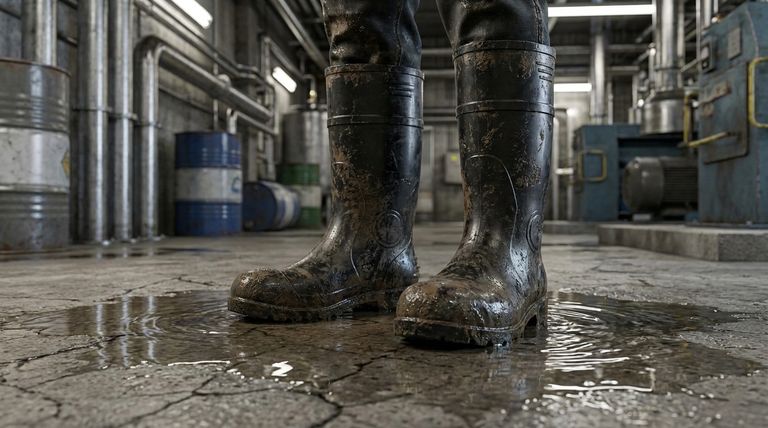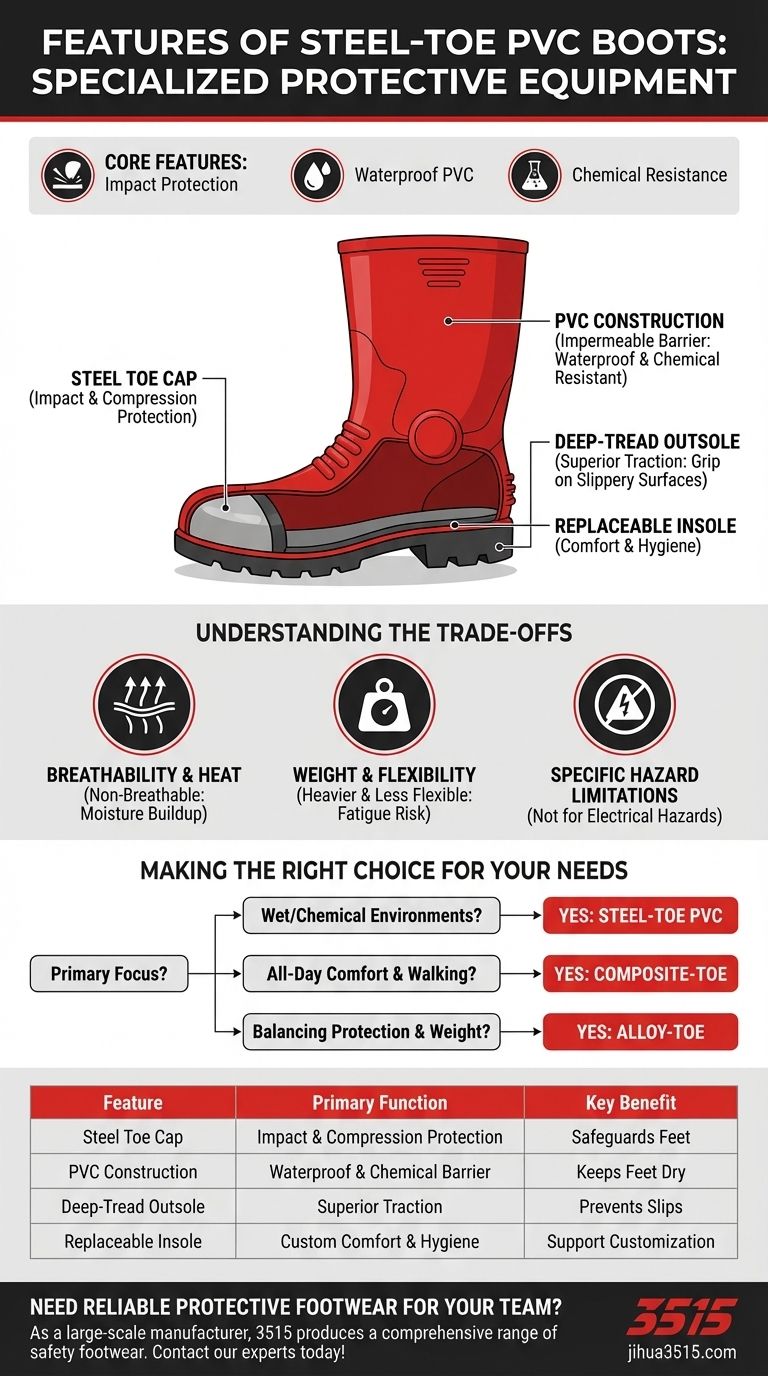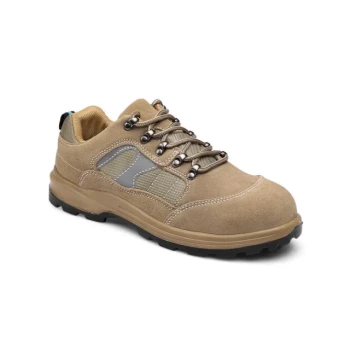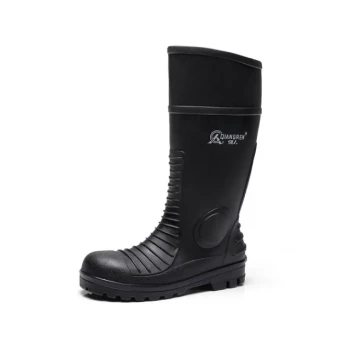At their core, steel-toe PVC boots are specialized protective equipment designed for hazardous environments. Their primary features include a steel cap for impact protection, a Polyvinyl Chloride (PVC) body that is completely waterproof, and a high degree of resistance to chemicals and acids. They are often equipped with deep-tread outsoles for superior traction on slippery surfaces.
These boots are not all-purpose work footwear; they are a purpose-built tool. Their value comes from providing maximum protection against specific industrial hazards like impacts, liquids, and chemicals, often at the expense of long-wear comfort and breathability.

Deconstructing the Key Features
To understand if these boots are right for you, we must examine each component's function. The design prioritizes safety and durability above all else.
The Protective Core: The Steel Toe
The defining feature is the steel toe cap embedded in the front of the boot. Its sole purpose is to protect your feet from crushing injuries caused by impact or compression. This makes them essential in high-risk environments like construction sites or warehouses.
The Impermeable Barrier: PVC Construction
The boot's body is made from Polyvinyl Chloride (PVC). This material creates a completely waterproof barrier, keeping feet dry in wet and muddy conditions. More importantly, it offers exceptional resistance to a wide range of chemicals, acids, and other industrial substances.
Stability and Grip: The Outsole
Most steel-toe PVC boots feature deep, aggressive tread patterns on their outsoles. This design is critical for maintaining traction and preventing slips and falls on wet, muddy, or slick surfaces commonly found in industrial and agricultural settings.
Interior Functionality: Comfort and Hygiene
While secondary to protection, manufacturers often include practical interior features. Many models come with replaceable insoles, allowing you to customize the level of comfort and support or simply replace them for hygienic reasons after heavy use.
Understanding the Trade-offs
No single piece of equipment is perfect for every situation. Understanding the inherent limitations of steel-toe PVC boots is crucial for making an informed decision.
Breathability and Heat Management
The same PVC that makes the boots waterproof also makes them completely non-breathable. In hot climates or during strenuous work, this can lead to significant heat and moisture buildup inside the boot, causing discomfort.
Weight and Flexibility
Steel is heavy, and PVC is a relatively rigid material. This combination results in a boot that is often heavier and less flexible than leather or synthetic alternatives. For jobs that require extensive walking or agility, this can lead to fatigue over a long shift.
Specific Hazard Limitations
It is critical to note that a standard steel toe does not provide protection against electrical hazards. If your work involves this risk, you must seek out boots specifically rated for it, which may use different protective materials.
Making the Right Choice for Your Needs
Selecting the correct boot means matching its features to your primary work environment and daily tasks.
- If your primary focus is protection in wet or chemical-heavy environments: The waterproof and chemical-resistant nature of steel-toe PVC boots makes them the definitive choice.
- If your primary focus is all-day comfort for a job with lots of walking: You may want to consider lighter composite-toe boots made from more breathable materials.
- If your primary focus is balancing impact protection with lower weight: Look into alloy toe boots, which use materials like aluminum or titanium to offer protection that is lighter than steel.
Ultimately, choosing the right boot is about selecting the most effective tool for the specific challenges of your job.
Summary Table:
| Feature | Primary Function | Key Benefit |
|---|---|---|
| Steel Toe Cap | Impact & Compression Protection | Safeguards feet from crushing injuries |
| PVC Construction | Waterproof & Chemical Barrier | Keeps feet dry and resists industrial substances |
| Deep-Tread Outsole | Superior Traction | Prevents slips on wet, muddy, or slick surfaces |
| Replaceable Insole | Custom Comfort & Hygiene | Allows for support customization and easy replacement |
Need Reliable Protective Footwear for Your Team?
As a large-scale manufacturer, 3515 produces a comprehensive range of safety footwear for distributors, brand owners, and bulk clients. Our production capabilities encompass all types of industrial shoes and boots, including high-performance steel-toe PVC models designed for maximum durability and protection in the toughest conditions.
We can help you equip your workforce with the right gear for their specific hazards. Contact our experts today to discuss your requirements and get a quote!
Visual Guide

Related Products
- Wholesale Safety Boots Manufacturer for Custom & Private Label Orders
- Wholesale Customizable Safety Boots Durable & Protective Footwear Manufacturing
- High Performance Fire-Retardant Waterproof Safety Boots
- Heavy-Duty Waterproof Nubuck Safety Boots Safety Shoes for Bulk Supply
- Premium Wholesale Waterproof Safety Boots High Performance Protection for Industrial Markets
People Also Ask
- What are common complaints with steel toe boots? Solve Pain & Discomfort for Good
- How does composite toe protection compare to steel toe? Choose the Right Safety Boot for Your Job
- What are the main differences between composite toe and steel toe shoes? Choose the Right Safety Shoe
- Why is it important for organizations to prioritize the use of steel toe shoes? Boost Safety & Productivity
- Is it true that steel toes can cause toes to get cut off? Debunking the Dangerous Myth
- Is there any truth to the myth about steel toe boots causing toe injuries upon impact? Debunking Common Safety Concerns
- Why can metal protective toecaps become a risk factor for dorsal foot ulcers? Learn to Prevent Pressure Point Injuries
- What is the importance of choosing the right size for steel toe boots? Avoid Injury and Boost Productivity



















